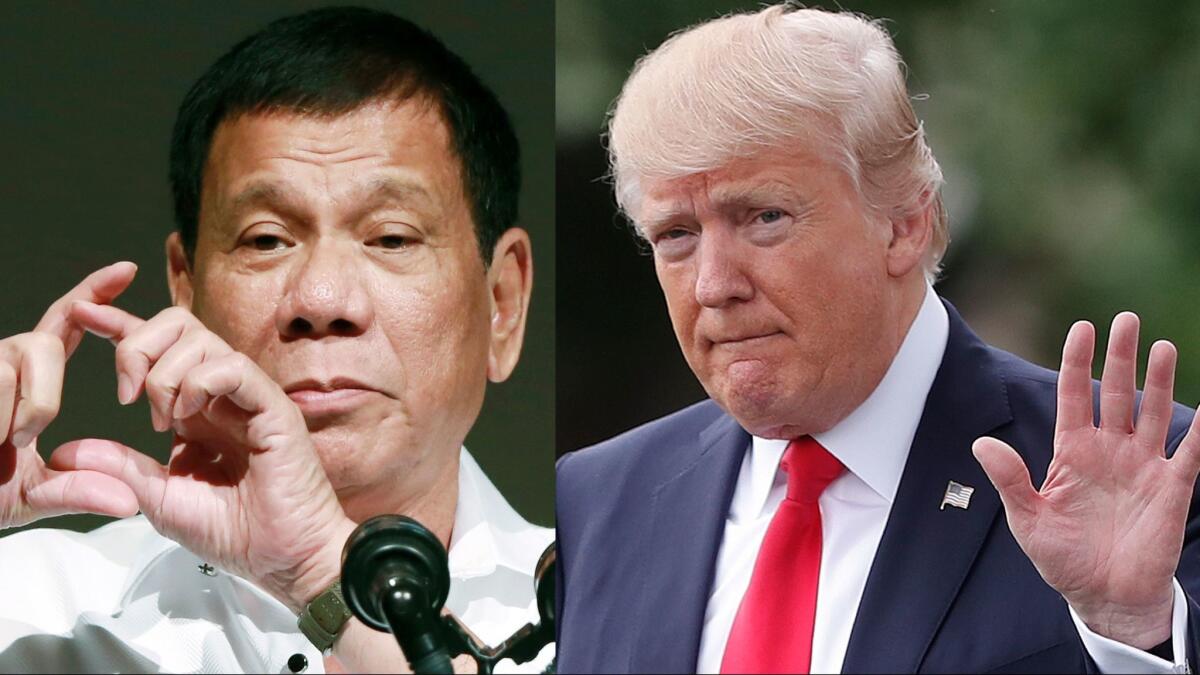Editorial: At what point does Trump’s comic inarticulateness become dangerous?

- Share via
Plenty of reasonable people believe that the United States should put its own strategic interests above concerns about human rights when it comes to foreign policy. To them, it’s simply a matter of being realistic.
But even those who believe the U.S. should be less critical of other countries’ human-rights records wouldn’t go so far as to praise a brutal strongman for behaving badly.
Yet that’s exactly what Donald Trump appears to have done when he spoke on the phone in April with President Rodrigo Duterte of the Philippines. According to a copy of Trump’s comments circulated by the Philippine Department of Foreign Affairs, the president praised Duterte for doing an “unbelievable job on the drug problem.” Then he repeated it: “A great job.”
Trump’s comments are deplorable. As everyone who has been paying even the slightest attention to events in the Philippines knows, Duterte’s government has sanctioned extrajudicial attacks as a solution to the nation’s drug problems, leading to the brutal killings of thousands of suspected dealers. He’s not doing a great job — he’s a thug, and his policies ought to be condemned, as human rights groups around the world have done.
But here’s another thing about Trump’s comments: They’re also weird. Our 45th president is such a strange, inarticulate, lazy speaker that his words often raise as many questions as they answer. For instance: Can we really be certain that Trump intended to praise Duterte for encouraging the killing of drug suspects? Or could the president have just been babbling, saying whatever came into his head?
Trump’s platitudes and tossed-off testimonials can be reckless, sending policy signals that the president never intended to send.
If so, it would hardly be the first time for this president. Sometimes he seems to have no understanding of the topic he’s discussing; at other times, he seems to be filling space in a conversation or falling back on a kind of flattering salesman’s patter that doesn’t require thought.
This is not meant to let him off the hook. What a president says matters very much; the world is parsing and considering his every word in a way that audiences don’t do on, say, “The Howard Stern Show” or “The Apprentice.”
But the inarticulate emptiness of Trump’s overused filler words sometimes suggests that there’s not a lot of thought behind them. His assertion that Duterte was doing a “great job” and an “unbelievable job” was familiar in tone to his bizarre comment to leaders of several Persian Gulf countries earlier this week that he would sell them “lots of beautiful military equipment.” What did that mean? In what sense are tanks, helicopters and missile defense systems beautiful? Was Trump trying to express something, or was he just adding meaningless adjectives?
Or his recent comments in the guest book at Yad Vashem in Israel saying it was “so amazing” to visit there “with all of my friends.” Amazing? Is that the most fitting word he could come up with for a Holocaust museum?
Actually, “amazing” is a generic word for Trump (like “great” or “beautiful”); he has used it to describe Infowars’ Alex Jones, Frederick Douglass, the Clintons, his wife, Melania, and now, Yad Vashem, to name just a few things. But when he used it at Yad Vashem, the result was a guest book comment that doesn’t communicate what he no doubt hoped to communicate.
It’s hardly news that Trump speaks in vague, woolly language, and that everything to him is great or fantastic or beautiful or amazing, except when it’s sad because it’s been done by a loser. During the campaign, a research team at Carnegie Mellon University concluded that Trump’s grammar in speeches was “just below” a sixth-grade level, and his vocabulary was in line with a seventh-grader’s.
He is who he is. He is neither Lincoln nor Obama. What’s more, his imprecise language, grade-school syntax and general inarticulateness have undoubtedly benefited him at times; they probably helped him get elected. But in a president, they are depressing. Don’t most of us want a president who can express our fears and aspirations better than we do?
And worse yet, Trump’s platitudes and tossed-off testimonials can be reckless, sending policy signals that the president never intended to send. His supporters may shrug it off because they don’t take him literally, but the Dutertes and the Putins and the Kim Jong-Uns are listening closely.
Follow the Opinion section on Twitter @latimesopinion and Facebook
More to Read
A cure for the common opinion
Get thought-provoking perspectives with our weekly newsletter.
You may occasionally receive promotional content from the Los Angeles Times.










